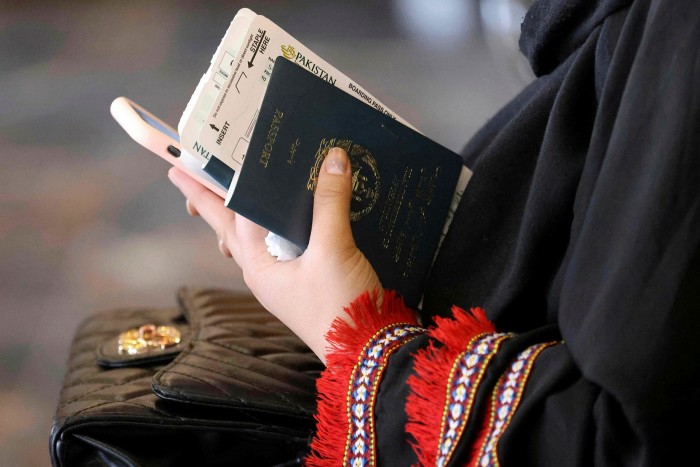Afghanistan updates
Sign up to myFT Daily Digest to be the first to know about Afghanistan news.
As a senior officer in Afghanistan’s former national intelligence services, Feroz worked for years with US and Nato forces, tracking Taliban activities and planning military action. The night the Taliban took Kabul, fighters came to his house to hunt him down; he evaded capture because he was sheltering with a friend.
Yet despite his deep involvement in the US-led war against the Taliban and the risk of retribution, the former National Directorate of Security officer and his family were left stranded in Afghanistan in the tumultuous US departure from the country. Although a decorated US military veteran made frantic phone calls on his behalf, Feroz’s repeated attempts to get into Kabul airport with his family to board a military evacuation flight failed.
Today he, another senior Afghan military intelligence officer Hamid, and their wives and children, are in hiding in Pakistan, reached after a dangerous three-day land journey. From there, Jayson Harpster, the American army veteran trying to help the men and who worked closely with them during the war, hopes to get them to the US.
“I knew if I stayed in Kabul it was a death sentence,” Feroz told the Financial Times in a telephone interview. It was better to “die trying to get out”, he added.
In the two weeks after the Taliban took Kabul on August 15, the US, its allies and private charter services airlifted about 123,000 people out of Afghanistan. Among them were foreign nationals and Afghans perceived to be at high risk of persecution such as military translators, journalists and public figures, including prominent women known for speaking out.
But it was a chaotic and capricious exodus as crowds of panicked Afghans battled to get into the heavily guarded airport and on to flights before the escape window closed. When the last American flight left Kabul on August 30, thousands who had aided the US-led mission since the 2001 invasion of Afghanistan were left behind.
They remain terrified of being persecuted for their work and political views and are waiting anxiously to see whether they will be granted refuge abroad — and whether the Taliban will let them go.
“America promised it wouldn’t leave its friends behind and it has clearly done just that,” said Jen Brick Murtazashvili, an Afghanistan expert at the University of Pittsburgh’s Graduate School of Public and International Affairs.
Afghans trying to leave on their own face numerous hurdles. Commercial flights have not resumed and while some regional airlines are operating charters, the cost is exorbitant, with a ticket for the one-hour flight to Islamabad priced at $1,200. Afghanistan’s neighbours have tightened border controls to deter an influx of refugees and visas for countries farther afield are hard to come by.

Just two weeks before the fall of Kabul, the US unveiled a priority refugee programme for Afghan citizens who had been employed by the US government and military, US-funded reconstruction projects or American media organisations and contractors. But eligible Afghans had barely started to compile the copious documents required to seek asylum under the scheme — including a personal reference from a US government official — when the Taliban took over.
US volunteer networks are now trying to help them prepare applications. “The system that [the US] set up is horribly bureaucratic,” said Murtazashvili, whose students are assisting more than 4,000 people with documentation. “It’s painful, it’s cruel and it’s a form of bureaucratic torture.”
Others who worked closely with the US mission but were not direct employees of the US or an American organisation do not qualify for the programme.
Among them are Afghans who worked for the UN, which as a matter of global policy does not evacuate locally recruited staff, except in exceptional circumstances. Some are lying low, still hoping for help in being relocated; others are trying to work out their own exit strategies.
“We are living a kind of mobile life — a few days in one relative’s home, then we sometimes come to my own home for one or two nights, and then go to another relative’s house,” said a senior UN political officer.
A UN official said the Taliban had provided written guarantees of safety for UN staff so the organisation can deliver humanitarian relief. But many employees who undertook political work remain anxious.
“It was freedom of speech here and we were easily expressing our views, and some of those views were not consistent with Islamic culture,” one said.
When they entered Kabul, the Taliban promised no one would be harmed because of their past work. But those on the front line in the struggle against the militant group have little faith in such pledges.
“An enemy is an enemy, no matter what they say,” said Hamid. “You can’t expect that somebody you’ve been fighting would let bygones be bygones.”
Harpster, who won a Bronze Star medal for his service in Afghanistan, hopes to get the two men into the US on humanitarian parole, which allows temporary visits in emergencies. “The mission isn’t over,” he said. “We are going to keep going until we bring them home.”
Yet Feroz, who recalls strong camaraderie with US and other foreign troops, is bewildered by how he wound up in hiding in Pakistan.
“I never expected that if the Taliban were to come to power the US would abandon us,” he said. “I thought they would have our backs. There was a lot of pride and a lot of encouragement for our work. I felt valued. And when you feel valued, you don’t feel like someone will abandon you.”
‘I thought they would have our backs’: the plight of Afghan allies the west left behind
‘I thought they would have our backs’: the plight of Afghan allies the west left behind